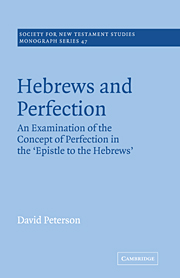Book contents
- Frontmatter
- Contents
- Preface
- Abbreviations
- 1 The Hermeneutical Issues
- 2 The Linguistic Background
- 3 The Perfecting of Christ: The Broad Perspective
- 4 The Perfecting of Christ: His Earthly Struggle
- 5 The Perfecting of Christ: His Exaltation
- 6 The Perfecting of Believers
- 7 Perfection and the Purpose of Hebrews
- Appendix A The Sinlessness of Christ and his Perfecting
- Appendix B When Did Jesus 'Become' High Priest?
- Notes
- Bibliography
- Index of Passages Quoted
2 - The Linguistic Background
Published online by Cambridge University Press: 28 October 2009
- Frontmatter
- Contents
- Preface
- Abbreviations
- 1 The Hermeneutical Issues
- 2 The Linguistic Background
- 3 The Perfecting of Christ: The Broad Perspective
- 4 The Perfecting of Christ: His Earthly Struggle
- 5 The Perfecting of Christ: His Exaltation
- 6 The Perfecting of Believers
- 7 Perfection and the Purpose of Hebrews
- Appendix A The Sinlessness of Christ and his Perfecting
- Appendix B When Did Jesus 'Become' High Priest?
- Notes
- Bibliography
- Index of Passages Quoted
Summary
The most thorough study of the terminology so far advanced is that of P. J. Du Plessis, and it will be noted in the following pages to what extent I am indebted to this work. However, his treatment of the verb in extra-Biblical and Septuagintal usage is surprisingly inadequate. It is true that Hebrews employs related terminology in important contexts, but τελειοεῦν is more extensively used than any other member of this word group, occurring nine times (2:10; 5:9; 7:19, 28; 9:9; 10:1,14; 11:40; 12: 23). It must therefore be the focus of my study in this preliminary exercise. Although the relevant article by G. Delling in the Theological Dictionary of the New Testament (vol. VIII, pp. 49–87) makes up for this lack in certain respects, its treatment of the Septuagintal evidence again leaves much to be desired.
Classical Greek sources
Du Plessis begins by noting the significance of τέλος in this literature. The ‘final notions of telos are never indicative of mere cessation, discontinuation or suspended action. When finality is incurred, it is accompanied by a hint of innate fulfilment’ (p. 41). Thus, τέλος implies ‘aim’ or ‘the preconceived end’. As a denomination of τέλος, the verb τελεῖν reflects some of the characteristics of the noun. Its ‘dynamic character is foremost: to perform a task or execute what is expected’ (p. 69). Its compass of meanings includes ‘to bring to an end’, ‘to finish’ and the technical religious sense ‘to initiate’, or even ‘to consecrate (to the priesthood)’ (pp. 69–72).
- Type
- Chapter
- Information
- Hebrews and PerfectionAn Examination of the Concept of Perfection in the Epistle to the Hebrews, pp. 21 - 48Publisher: Cambridge University PressPrint publication year: 1982



